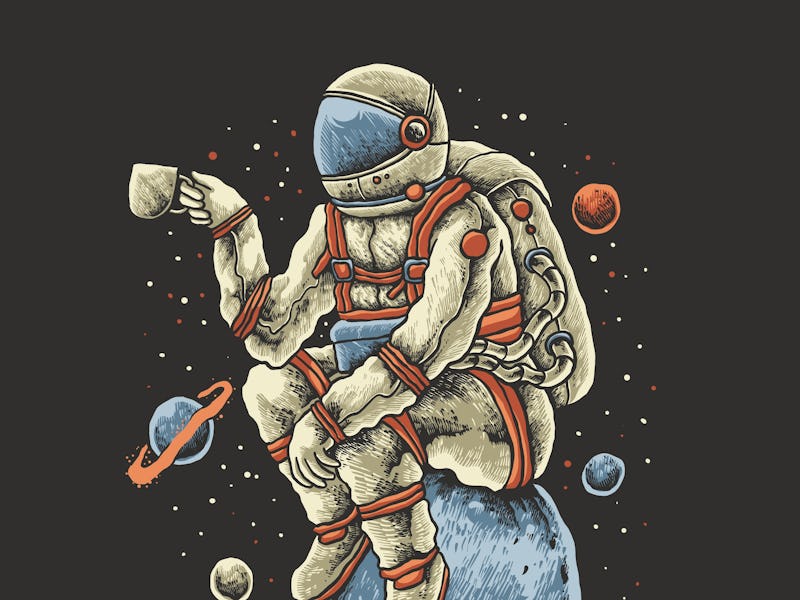One ignored factor is cited as making Mars feel like home
Plus: It’s Gut Week!

A timeless bit, maybe best-executed in 1989’s Batman, is the very long table date. It involves two people in a Great Old Dining Room, each sitting at either end of a very long table made of Oak or Mahogany. They can’t hear each other. They can’t pass the salt. “WHAT?!” one says to the other. Inevitably, they scoot closer together, or they carry on with the meal in silence. It’s a comment on class, civility, and our bizarre adherence to social norms, all in one visual gag.
But you might long for such an expansive experience and the foie gras that comes with it if you’re living full-time in a space capsule. Roominess aside, familiarity with our Earthly life will be essential to make humanity a species that lives in significant numbers in the great beyond.
Those touches of Earth — even if it involves a VR presentation of a long oak table — will be welcome, especially if you’re a Bruce Wayne type.
That insight is the subject of our lead story today in Inverse Daily. I’m Nick Lucchesi, an editor here. Thanks for being with us!
This is an adapted version of the Inverse Daily newsletter for Tuesday, November 23, 2021. Subscribe for free and earn rewards for reading every day in your inbox. ✉️
Nostalgia is the future of space food
[By Sarah Wells]
Foodies on Earth are constantly chasing the latest culinary innovations, from meat-flavored foams to square-shaped croissants.
But if Marianna Obrist, a professor of multisensory interfaces at University College London, has anything to say about it, the future of culinary experience may be literally out of this world.
“Fostering research around the sensorial, emotional, and social aspects of eating, in addition to nutritional factors, is essential for long-term missions,” Obrist tells Inverse.
Obrist’s work looks at how senses like smell, taste, and touch can influence our experiences of the world and even be tweaked to enhance them. And now, she wants to turn our attention to how that experience will work in space.
It’s a wild vision that includes ideas like a VR experience that could transport you from a cramped space capsule into a virtual mid-century dining room to eat carefully crafted space food that tastes like home.
Related:
How to get good at exercise: The secret’s in front of you
[By Sam Reiss]
There’s a saying popular in the small world outside the gym that the definition of insanity is doing the same thing repeatedly and expecting different results. That if an approach doesn’t work, try another one.
Inside the gym, what works is what gets you somewhere. How you get there is much less important than showing up.
So what’s the relationship between process and results in lifting? At first blush, the sport feels like a chase. We work out to reach goals: getting strong, looking good. So much of what we focus on and measure — heavy poundage in a powerlifting competition, body fat percentage, the size of your quads — are numbers we’re striving to reach.
Related:
Scientists link the gut to hormone-fueled cancer
Cancer sucks. Cancer treatments don’t make you feel great, either. Your hair can fall out, your reproduction drive can disappear, and your stomach can fail to keep anything down.
To make matters worse, cancer treatments don’t always work — for some men with late-stage prostate cancer, that can be particularly true. There is no crystal ball to tell doctors if one treatment will perform better than another, either, but there might be no need for divination whatsoever — the answer may lie in our gut.
In a study published in the journal Science in October, scientists found that specific bacterial species in our gut may influence how successful androgen deprivation therapy — a kind of hormone replacement treatment — is in treating prostate cancer. These gut bacteria, it seems, generate the same hormones ADT tries to suppress.
Read the full story, part of Inverse Gut Week.
Related:
Astra LV0007.
The “FedEx of Space” reach orbit
[By Mike Brown]
An elusive, California-based spaceflight company is the latest to reach orbit successfully — and it plans to host daily flights in just four years.
On Saturday, Astra announced via Twitter that its LV0007 mission reached orbit from the Astra Spaceport in Kodiak, Alaska. The rocket, which carried a payload for the United States Space Force, took off at 1:16 a.m. Eastern time. The feat earned the praise of SpaceX CEO Elon Musk, who commented on Twitter: “Congrats! Orbit is not easy.”
The milestone means Astra is one of a handful of private companies to develop an orbital rocket successfully. Astra declared itself “the first rocket company to reach orbit in less than five years after the launch.”
Related:
Reader mail:
Jim writes in to share his praise for the song of the day:
Hello! Just a quick update on the past few "Songs of the Day" in which I listen to as I read Inverse. The group Bloc Party [ed: the 11/16/21 email] I have never heard and they blew my mind! A new fave for sure. Loveless by My Bloody Valentine [ed: the 11/17/21 email] is one of my all-time favorites and one of the best albums from the early nineties. Today was interesting as [the song of the day] was “History Repeats” [ed: 11/22/21 email] and I thought of “History NEVER Repeats” by Split Enz! Thanks for making Inverse a multiple sense modality. —Jim
Thanks, Jim! If you have a letter you’d like to send in, keep reading...
About the newsletter: Do you think it can be improved? Have a story idea? Want to share a story about the time you met an astronaut? Send those thoughts and more to newsletter@inverse.com.
- Song of the Day: “Hold on, we’re going home,” by Drake.